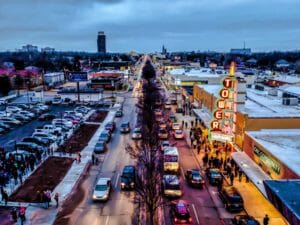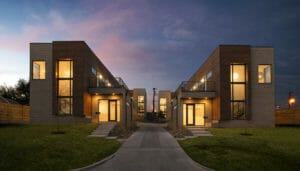Top Story
Name: David Wanzer
Company: Pivot Project
City: Oklahoma City, Oklahoma
Product Types: Adaptive use, urban infill
What did you do before you were a developer?
My first degree is in finance, and I went back to school in 2000 when I was 30. I changed my career and got a master’s of architecture. I moved back to Oklahoma City and started a design practice with a grad school buddy. I did that for a solid five years and we did a lot of stuff in the urban environment at that point. We did some modern homes, we worked for an urban developer helping revitalize a part of Oklahoma City called Film Row, which was a distribution hub for Hollywood, and we worked with the National Parks Service doing adaptive use projects before I did my first development project.
What motivated you to make the leap into development?
I always wanted to do my own projects. Through grad school, I was a very inspired by what Jonathan Segal was doing in San Diego and what a lot of architects were doing at the Woodbury School. I had a huge passion for modern, residential architecture, and we wanted to develop our own projects bringing really cool architecture to the Oklahoma City community. Being the developer, designer, builder—covering all the bases and bringing the project from start to finish—motivated me to take the leap into development.
In dealing with the day-to-day operation of your enterprise, what do you find to be the most difficult to accomplish?
Juggling all the pieces is probably the hardest part of the day-to-day. It’s juggling architects, general contractors, tenants, the financing, the bankers, city regulations. . . . It’s what I love, but it’s also the most challenging part of the day-to-day work [chuckles].
Where do you turn to get a fresh perspective or experienced insight on a prospective or existing deal?
I’m really fortunate to have my two partners and our project manager. We all come from different backgrounds. Architecture is my background. I now work with my former banker who I worked with on my first few deals. And then a former commercial real estate appraiser. We all have a unique perspective on projects.
What gets you out of bed every day to do what you do?
I love what we do. We’re very community focused. Our tagline is, “Cultivating community through thoughtful development.” That mission is what gets me out of bed every day. We tackle a lot of tough projects. Buildings that have been vacant and derelict forever. That challenge of bringing that old building back to life—presenting opportunities for entrepreneurs to bring new businesses to these buildings. That’s what gets me out of bed everyday—continuing to effect change in Oklahoma City and making it a better place to live.
What does being a successful real estate developer mean to you?
It piggy-backs off your last question. Being a successful real estate developer is continuing to effect change in our communities by providing opportunities to local entrepreneurs to come in and open a cool new restaurant, new boutique, creative office space—that defines success to me.
In looking at the next one to two years, what do you see as the biggest challenges to your business and projects?
We’re in a transition period right now. In the next year or two, there are some scale jumps for us, and that’ll provide a whole new set of challenges. We feel that this first couple of years of our company has left an imprint, and the next step is to move into the “toddler phase.” We’ve been crawling, and now it’s time to start walking.
What skill or trait do you think are most important to make the leap into real estate development?
You need a good understanding of the process and taking a project from start to finish. You need to know what it takes to hire and work with an architect and a general contractor. It helps if you know the layout of your city, and the municipal code, zoning, and permitting. And then there’s the financing of it—how to build and manipulate a pro forma and get financing from a bank or investors. It’s all critical, but it’s hard. You can learn along the way. We have at times! Sometimes, it’s a lot of trial by fire.
What skill or trait did you lack at one point, and how did you overcome it?
I have a good business sense; however, starting my first development project, I had to brush up on finance knowledge and building pro formas. I bought a couple of ULI books, and I took the pro forma modeling workshop. When I hired my first employee, who was a project manager, I gave her those same ULI development books.
What was a memorable mistake?
We bought a little building that we thought would be a very easy restaurant build—3,300 square feet, on a major traffic street in the urban core. It had a really terrible, blue mansard roof on it and bars over the windows. It had parking! We saw the potential. What we failed to do was strip those extra layers off of it, because we thought we’d get a tenant very quickly. It languished, and languished, and languished. Finally, we were like, “Well, let’s do a first phase of work.” We stripped that mansard roof off, took the bars off, cleaned it up, took down the pawn shop sign, and we started getting calls on it immediately.

The Tower Theater, an historic renovation project by Pivot Project, activates NW 23rd Street in Oklahoma City
I constantly remind myself that not everyone sees the world as I see it. Not everyone sees an empty piece of dirt as I see it. Not everyone sees the empty building without a roof as I see it. People have to see it done. You have to make people realize that, oh, it doesn’t have to have bars on the window; and oh, it doesn’t have to have that stupid roof on it.
How has your involvement with ULI played a role in your career or transitions?
It starts at my local ULI district council. It’s going to sound like a sales pitch, but it isn’t. I met my two business partners through ULI Oklahoma, so it’s been a huge influence on me, and it’s helped me grow as a developer. As I was starting to build these modern homes that I was developing, I went to a small-scale developers’ workshop in Seattle, and I came back from that conference—and I still have my notes from the conference, and I still refer to them—I was set on being a designer-developer, and that conference completely shifted my trajectory because I was inspired by what I heard from the panels. Within a year of that conference, I closed my design firm, I segued into three adaptive use projects, and I was able to get financing through some ULI connections. The banker introduced me to the equity partners, and that banker is now my business partner.
What’s your favorite city to visit and why?
My wife and I are making it to Denver and Boulder a lot recently. There’s such a great outdoor lifestyle. There’s community, and we love going up there to visit the brewpubs, looking at new development, and seeing the food and beverage ideas that are going on up there. Food and beverage is a big part of our development, and we continue to try to evolve our local culinary scene through our work.
About Entrepreneur Profiles
Entrepreneur Profiles are conversations with real estate development professionals who, in most cases, have recently made the leap into the industry whether as young individuals fresh out of school or as mid-career transitions.
With a focus on small-scale developers often doing incremental and transformative work, these are quick and easy to read profiles to raise awareness of these professionals. By telling their stories, the Urban Land Institute hopes to inspire the next generation of small scale entrepreneurs to transform their own communities. See all of the Entrepreneur Profiles.
